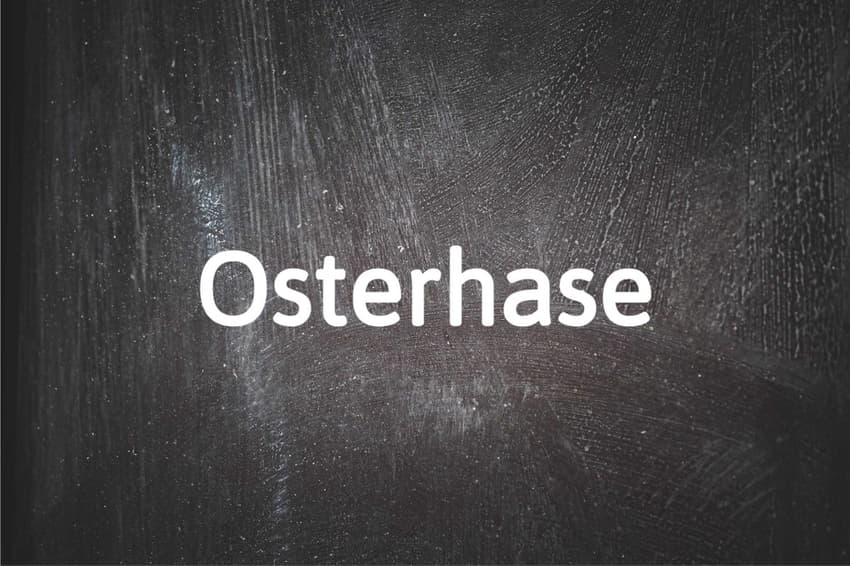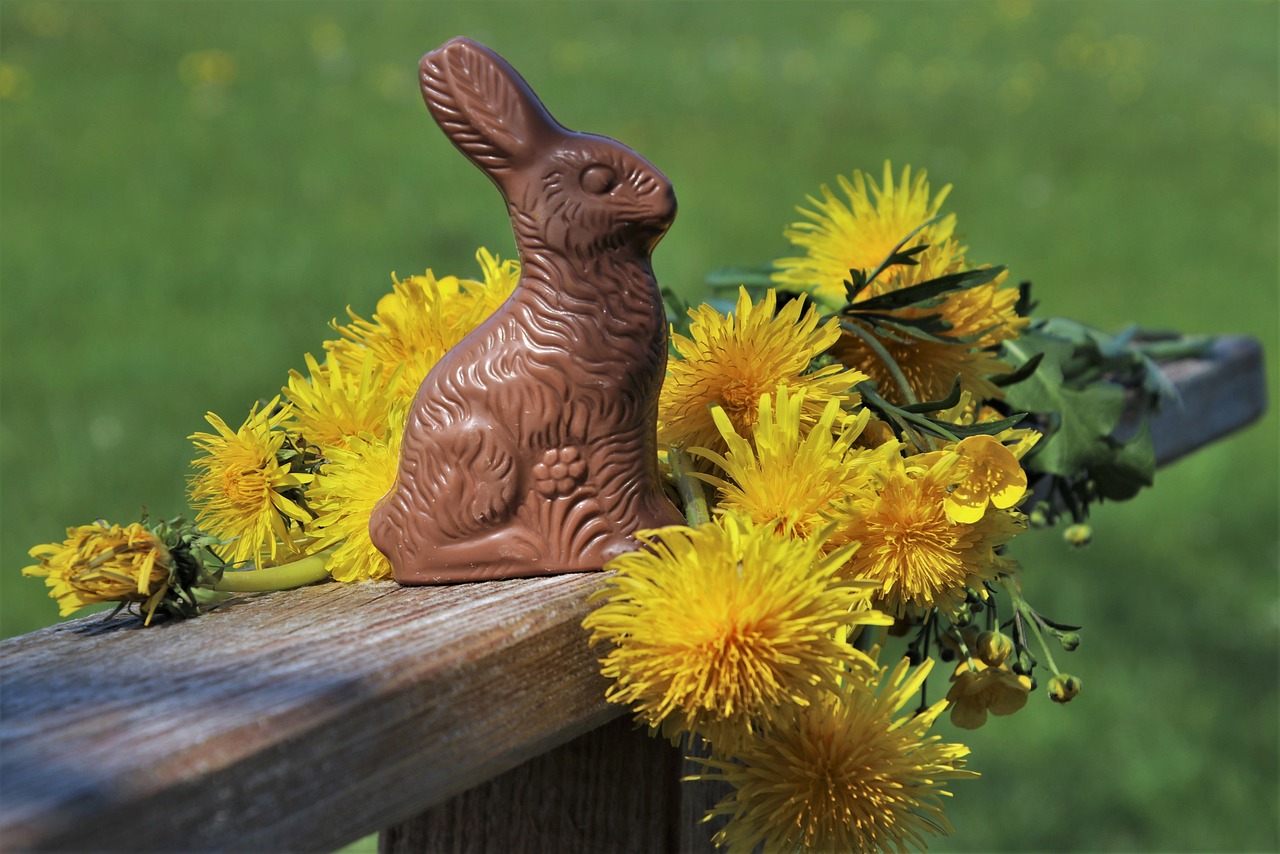German word of the day: Osterhase

You might hear families in Austria talking about the Osterhase in the run up to Easter.
Let’s start this off with a song that might get stuck in your head. Around Easter each year, young children in German-speaking countries are very likely to sing “Stups, der kleine Osterhase” (“Stups, the little Easter Bunny.”)
It’s a song about a clumsy Easter bunny who keeps messing things up. Here's a version of the song, sung by German singer-songwriter Rolf Zuckowski:
The Osterhase is, like its English equivalent, a combination of the words Ostern (“Easter”) and Hase (“bunny.”)
“Easter” and the German Ostern have a similar ring to them. That is because they probably have the same origin - a combination of the Old High German Ôstarûn, as well as the Old English word ēastron.
READ ALSO: How to celebrate Easter like an Austrian
Both are thought to date back to the Indo-European word ausos, which means “dawn.” The sun rises in the East (Osten in German). Ostern is now believed to be linked to that dawn – probably because of the Christian belief in the resurrection of Jesus Christ on Easter Sunday.
What's the history of der Osterhase?
According to some, the hare has a special connection to the Christian Easter season’s themes of resurrection and eternal life. This is because young bunnies are born into the world with 'open eyes' - meaning they’re fully developed.
But why exactly does the Hase bring eggs around Easter?
The roots of the Osterhase can be traced back to Germany, although the exact origins are debated.
One theory circulated often is that the hare was a companion of a Germanic spring goddess named Ostara, for whom the German word for Easter - Ostern - is supposedly named. But the existence of a goddess called Ostara is disputed.
Another theory is that in the Middle Ages, Green or Maundy Thursday before Easter was typically the end of the business year and therefore when farmers would have to pay their dues to landowners. Due to the Lent time fasting leading up to Easter, they had a surplus of eggs, so they would often pay these dues with cooked eggs and hares they had killed in their fields.
This combination of the hare and eggs became intertwined.
By the 17th century, parents in Germany were telling their kids the eggs came from Easter bunnies, although foxes, cranes and storks were also sometimes named, depending on the region. By the end of the Second World War, the bunny had become mainstream.
Regardless of how the trend started, people also associate eggs with the symbol for birth and new life, which may be why the Osterhase brings Ostereier (Easter eggs).
The custom came to Vienna from Alsace, Swabia and Franconia. Easter eggs were initially hidden on Maundy Thursday (because eggs laid on that day were believed to have magical powers), but the custom gradually shifted to the Easter weekend.
The commercialisation of Easter - and the inclusion of chocolate in Easter celebrations - began towards the end of the 19th century. Through German emigrants, the tradition of the Easter Bunny reached the United States and spread worldwide.
Your local supermarket no doubt has lots of chocolate Easter bunnies and eggs at this time of year.
So now that you know why there is an Osterhase, make sure to go outside and hide some treats for your children on Easter Sunday – while humming “Stups, der kleine Osterhase,” of course.

A chocolate Osterhase. Image by 🌸♡💙♡🌸 Julita 🌸♡💙♡🌸 from Pixabay
How to use it:
Wann kommt endlich der Osterhase und versteckt die Eier?
When does the Easter bunny finally arrive and hide the eggs?
Ich glaube nicht mehr an den Osterhasen.
I don’t believe in the Easter Bunny anymore.
Warum heißt es “Osterhase”? Hasen legen doch keine Eier.
Why is it called “Easter Bunny”? Bunnies don’t lay eggs after all.
Comments
See Also
Let’s start this off with a song that might get stuck in your head. Around Easter each year, young children in German-speaking countries are very likely to sing “Stups, der kleine Osterhase” (“Stups, the little Easter Bunny.”)
It’s a song about a clumsy Easter bunny who keeps messing things up. Here's a version of the song, sung by German singer-songwriter Rolf Zuckowski:
The Osterhase is, like its English equivalent, a combination of the words Ostern (“Easter”) and Hase (“bunny.”)
“Easter” and the German Ostern have a similar ring to them. That is because they probably have the same origin - a combination of the Old High German Ôstarûn, as well as the Old English word ēastron.
READ ALSO: How to celebrate Easter like an Austrian
Both are thought to date back to the Indo-European word ausos, which means “dawn.” The sun rises in the East (Osten in German). Ostern is now believed to be linked to that dawn – probably because of the Christian belief in the resurrection of Jesus Christ on Easter Sunday.
What's the history of der Osterhase?
According to some, the hare has a special connection to the Christian Easter season’s themes of resurrection and eternal life. This is because young bunnies are born into the world with 'open eyes' - meaning they’re fully developed.
But why exactly does the Hase bring eggs around Easter?
The roots of the Osterhase can be traced back to Germany, although the exact origins are debated.
One theory circulated often is that the hare was a companion of a Germanic spring goddess named Ostara, for whom the German word for Easter - Ostern - is supposedly named. But the existence of a goddess called Ostara is disputed.
Another theory is that in the Middle Ages, Green or Maundy Thursday before Easter was typically the end of the business year and therefore when farmers would have to pay their dues to landowners. Due to the Lent time fasting leading up to Easter, they had a surplus of eggs, so they would often pay these dues with cooked eggs and hares they had killed in their fields.
This combination of the hare and eggs became intertwined.
By the 17th century, parents in Germany were telling their kids the eggs came from Easter bunnies, although foxes, cranes and storks were also sometimes named, depending on the region. By the end of the Second World War, the bunny had become mainstream.
Regardless of how the trend started, people also associate eggs with the symbol for birth and new life, which may be why the Osterhase brings Ostereier (Easter eggs).
The custom came to Vienna from Alsace, Swabia and Franconia. Easter eggs were initially hidden on Maundy Thursday (because eggs laid on that day were believed to have magical powers), but the custom gradually shifted to the Easter weekend.
The commercialisation of Easter - and the inclusion of chocolate in Easter celebrations - began towards the end of the 19th century. Through German emigrants, the tradition of the Easter Bunny reached the United States and spread worldwide.
Your local supermarket no doubt has lots of chocolate Easter bunnies and eggs at this time of year.
So now that you know why there is an Osterhase, make sure to go outside and hide some treats for your children on Easter Sunday – while humming “Stups, der kleine Osterhase,” of course.

How to use it:
Wann kommt endlich der Osterhase und versteckt die Eier?
When does the Easter bunny finally arrive and hide the eggs?
Ich glaube nicht mehr an den Osterhasen.
I don’t believe in the Easter Bunny anymore.
Warum heißt es “Osterhase”? Hasen legen doch keine Eier.
Why is it called “Easter Bunny”? Bunnies don’t lay eggs after all.
Join the conversation in our comments section below. Share your own views and experience and if you have a question or suggestion for our journalists then email us at [email protected].
Please keep comments civil, constructive and on topic – and make sure to read our terms of use before getting involved.
Please log in here to leave a comment.